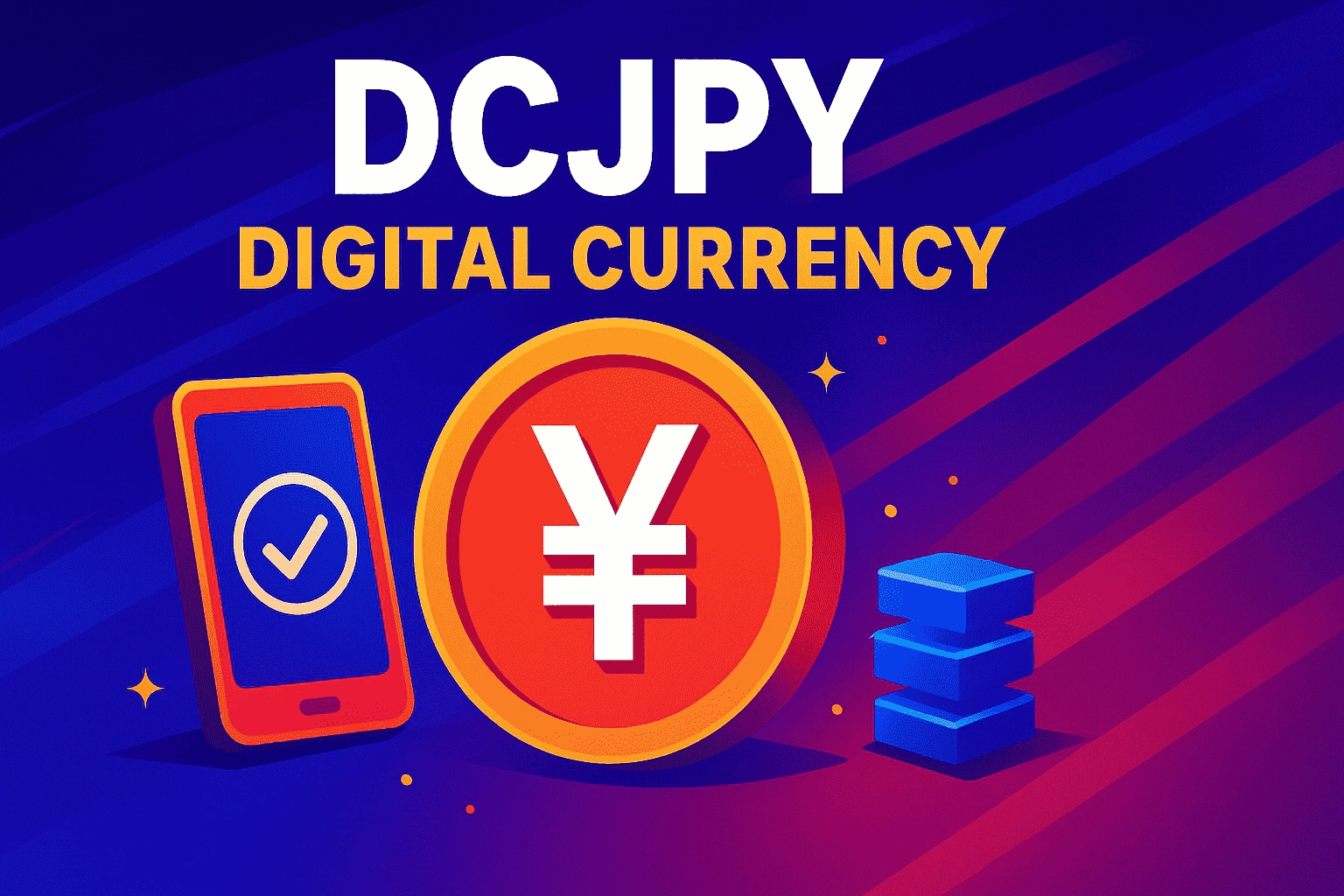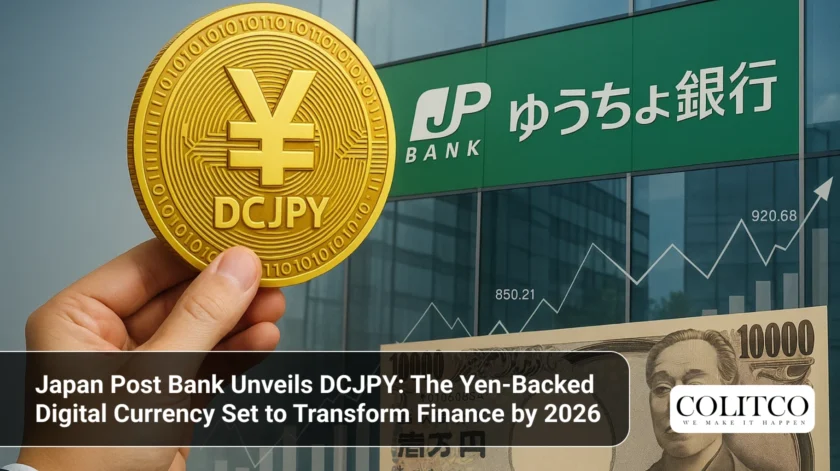Japan Post Bank will roll out a yen-backed digital currency, DCJPY, in fiscal year 2026, enabling depositors to transfer their savings into tokenised funds. The digital currency will allow for near-instant settlements with full backing by regulated deposits.
DCJPY: A New Era of Digital Finance
DCJPY is the digital currency (yen-backed) created by DeCurret DCP, the Japanese subsidiary of Internet Initiative Japan. All DCJPY tokens are equivalent to one yen and are directly connected to the savings accounts of depositors. This architecture has stability, the guarantee of transparency, and deposits that other stablecoins do not offer.
 DCJPY is directly backed by yen deposits, ensuring stability and instant convertibility
DCJPY is directly backed by yen deposits, ensuring stability and instant convertibility
Depositors will trade their yen for DCJPY through an app, making digital security, small-lot real estate, company bonds, and nonfungible tokens (NFTs) transactions faster. Secure and auditable transfers are assured through the blockchain-based system.
Private Blockchain for Enhanced Security
The digital currency will operate on a permissioned blockchain developed by DeCurret DCP. Unlike public networks, this blockchain only opens doors to approved participants while ensuring Japan’s financial regulations are met.
Freeze mechanisms and auditable ledgers are incorporated into the system to protect against money laundering and fraud. Both retail and institutional investors using the yen-backed digital currency are offered a secure platform.
Completing the Bank of Japan’s CBDC Initiatives
Japan Post Bank’s DCJPY complements the Bank of Japan’s research on a national central bank digital currency. BOJ pilot-tested multi-phased tests on velocity, security, and offline payment capability.
DCJPY provides real-world observation on take-up by users and transactional effectiveness. The implementation will allow regulators to view how operations fare and prepare for a potential national digital yen framework.
Accessibility for Retail and Corporate Clients
DCJPY accounts are linked 1:1 to yen-denominated savings accounts of the depositors. Customers can convert back to yen at any moment, making it easy for day-to-day financial transactions.
The cashless currency gives real-time settlement for transactions involving digital securities, NFTs, and tokenised physical assets. Japan Post Bank is also planning additional utilisation of DCJPY by the end of the fiscal year 2026 for small-sized real estate and corporate bonds.
Integration with Local Governments
Japan Post Bank anticipates local governments will use DCJPY to make payments of subsidies, social entitlements, and other public funds. The system will reduce administrative overhead and make it easier for citizens to conduct financial transactions.
Automating them, DCJPY could enhance government program efficiency with transparency and speed at reduced reliance on traditional banking transfers.
Market Potential and Investment Opportunities
With a deposit of approximately ¥190 trillion ($1.29 trillion), Japan Post Bank can rapidly increase DCJPY on its 120 million accounts. Tokenisation of deposits unlocks new worlds of investment opportunities in digital assets and fractional ownership of real assets.
DCJPY-based products will have yields of 3–5%, a competitive choice in Japan’s zero-interest rate economy. Investors can access tokenised bonds, real estate, and other digital financial instruments with improved liquidity.
Regulatory Certainty and Institutional Adoption
DCJPY has been described as a tokenized deposit, rather than a stablecoin, thus avoiding the volatility of cryptocurrencies. Its 1:1 yen reserve is in line with the requirements of the Financial Services Agency, which provides a guarantee to institutional investors.
The model allows for greater adoption by financial institutions domestically as well as globally, since investors can invest funds securely under an over-the-counter digital currency system.
Operational Efficiency and Transaction Speed
The blockchain system provides for instant settlement that reduces traditional settlement windows from days to seconds. Operating costs of financial institutions are also observed to decrease through improved processing.
It also provides for real-time auditing and transparency that can reduce compliance reporting costs and help reinforce investor confidence in yen-backed digital currency transactions.
Also Read: Westpac Share Price Moves as Business and Wealth Division Posts Strong Growth
Risks and System Resilience
Though DCJPY provides vast potential, there are challenges, including cybersecurity threats and potential resistance by traditional banks. The enormous market share of Japan Post Bank does provide a sound foundation for uptake and scaling, though.
Regular observation of transaction performance, security, and experience will dictate improvements. Evolution with DCJPY may carry through to Japan’s broader digital currency policy and future financial infrastructure.
Market Outlook
The launch of DCJPY turns Japan into a digital finance leader. Through tokenisation of deposits, Japan Post Bank creates a link between traditional banking and tokenised digital asset markets.

DCJPY marks a major step in Japan’s transition to a fully digital financial ecosystem
Synergistic effect with tokenised real-world assets can open the door to an $18.9 trillion market by 2033, up from $600 billion in 2025. The currency can attract retail and institutional investors seeking greater returns as well as faster financial transactions within a regulated environment.
FAQs
- What is DCJPY?
DCJPY is a yen-backed digital currency developed by Japan Post Bank and DeCurret DCP. Each token is backed 1:1 by yen deposits, ensuring security and stability. - When will DCJPY be launched?
Japan Post Bank plans to launch DCJPY in fiscal year 2026. The rollout will start with retail depositors and later expand to corporate and institutional clients. - How is DCJPY different from stablecoins?
Unlike typical stablecoins, DCJPY is classified as a tokenized deposit, fully regulated under Japan’s financial laws, and covered by deposit insurance. - What can DCJPY be used for?
DCJPY can be used for instant settlements of digital securities, nonfungible tokens (NFTs), corporate bonds, and small-lot real estate transactions. - Is DCJPY safe?
Yes. DCJPY operates on a permissioned blockchain with built-in security features, including fraud prevention and transaction monitoring. - How does DCJPY connect to regular bank deposits?
Depositors can convert yen into DCJPY at a 1:1 ratio through a linked savings account. The digital tokens can also be converted back to yen at any time. - Will DCJPY replace cash in Japan?
No. DCJPY is designed to complement existing payment systems and enhance efficiency, not replace physical cash or traditional yen transfers. - How does DCJPY relate to the Bank of Japan’s CBDC?
DCJPY is a private-sector initiative that complements the Bank of Japan’s central bank digital currency (CBDC) research. It provides real-world insights into digital currency adoption.












